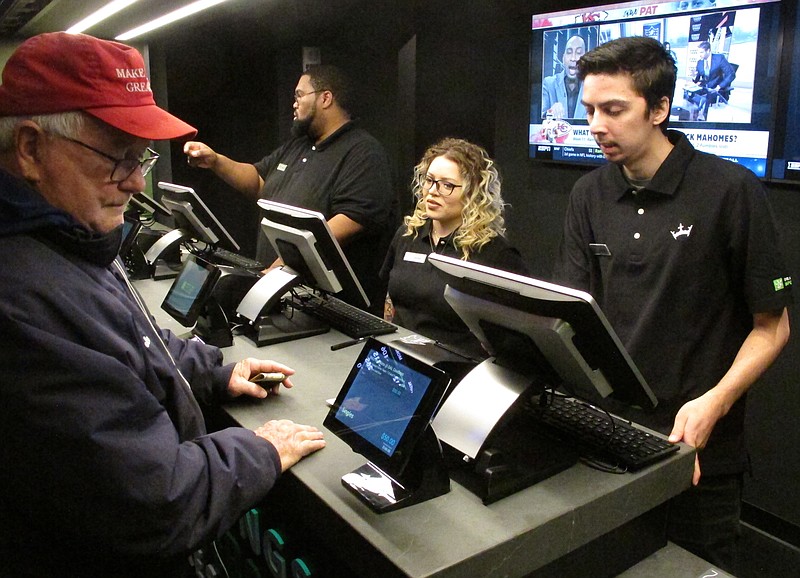For the vast majority of their still-young lives, my daughters - ages 14 and 12 - have somewhat fairly considered their father to be something of a dinosaur.
They see a 61-year-old man who prefers khakis to blue jeans, his shirttail tucked in (at least when he remembers to tuck it in), reluctantly owns a cellphone - flip variety - but still warmly embraces his land line and whose next online purchase will be his first, and they openly wonder how they could wind up with such a grumpy old cuss in the Daddy Lottery.
And Monday brought further news of how out of touch I've become when SportsBusiness Journal released its annual list of the most influential people on the business side of sports and the generic "American Sports Gambler" stood No. 1.
Now I'll plead guilty to buying lottery tickets now and then, especially when Powerball or Mega Millions reaches nine figures. But I don't bet ballgames. Never have. Never will. Not online. Not with a friend. Certainly not with a bookie.
Perhaps it's because my father was in college when the point-fixing scandals rocked college basketball at the dawn of the 1950s. Perhaps because I hate the thought of watching a great game on television, a game that the team I want to win wins, but I'm miserable because that team didn't beat the spread.
And now that almost every state in the union is rushing to legalize sports betting, I also worry about the fallout when Big State U - or even the University of Tennessee at Chattanooga - blows a game, or the spread, because Player A misses two free throws or a 30-yard field-goal try late and costs all those gamblers in the crowd their bets.
Will they be madder because their team lost or because Player A's misfortune cost them money?
And if they take it out on the player through social media, or at the mall, or from the stands, how will that player handle it? Should he even be expected to handle it?
I'm not so out of touch as to fail to understand what a huge business sports has become, all the way down to the Madden video games. More than a few Power Five conference school budgets now comfortably exceed $100 million annually. The NFL television contracts alone total over $7 billion a year for the league.
Perhaps far more important than that to this discussion, the American Gaming Association estimates that Americans bet more than $150 billion on sports in 2017, with only a small percentage of those wagers made through legal sportsbooks. To underscore that belief, sportsbooks in Nevada - where sports gambling long has been legal - took $4.8 billion in bets in 2017, which would be roughly 3 percent of all the money bet on sports nationwide.
With all states presumably searching for new revenue streams - though, we hope, not to fund gambling-addiction centers - the U.S. Supreme Court's decision on May 14 to strike down a law that prohibited state-sponsored sports betting in almost every state except Nevada opened the floodgates.
Just in New Jersey, which began taking sports bets in June, more than $1 billion has been wagered, more than 70 percent of it online.
Delaware, Mississippi, New Mexico, Pennsylvania, Rhode Island and West Virginia also have entered the arena. More than a dozen other states are strongly considering joining them in 2019.
As retired New Jersey state senator Raymond Lesniak - who led the Garden State's charge to allow its casinos and racetracks to add sports betting - told ESPN.com on Monday: "The American Sports Gambler has been the most influential person in sports biz for decades. It just took a United States Supreme Court decision to recognize it."
Maybe it's better this way. It's at least out in the open. You theoretically can't "owe" somebody enough money to get your kneecaps broken because you supposedly pay up front, like a debit card. That doesn't erase the notion that a game could be fixed. But it does strongly negate the more dangerous, underworld side of the issue.
Also, much like the arrival of lotteries before it, state-sponsored sports gambling will generate huge revenue streams for those states that embrace it. We're talking streams starting with a "B," which sounds berry, berry good on the front end.
So if you already bet on sports, take a bow. Puff out your chest. Smile wide as you put $50 (or $5,000) on Duke to win the 2019 NCAA men's basketball championship. Because you, at least collectively, have become the most influential person out there when it comes to the business of sports.
And maybe this money suddenly being bet on sports won't come from the savings account meant to pay for college. Or the Angel Tree tag that there's not enough money to fund because the Vols won by three instead of five. Or the family vacation to the beach that's now about to become a staycation because it's tougher to avoid your inner demons when you no longer have to venture into a dark corner to satisfy them.
A dear friend and former coach once told me, "You can't legislate morality."
But a far wiser person once said that the love of money is the root of all evil.
To watch at least two things we used to condemn - marijuana and gambling - suddenly become legal for the sole purpose of revenue, makes you wonder what we'll condone next for a few more fistfuls of dollars.
Contact Mark Wiedmer at mwiedmer@timesfreepress.com.
